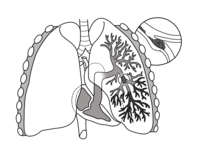
Photo from wikipedia
Elderly patients presenting with acute pulmonary embolism (PE) frequently have significant underlying comorbidities which may condition the prognosis. The current study aimed to determine the ability of Charlson comorbidity index… Click to show full abstract
Elderly patients presenting with acute pulmonary embolism (PE) frequently have significant underlying comorbidities which may condition the prognosis. The current study aimed to determine the ability of Charlson comorbidity index (CCI) score to predict short and long-term mortality in elderly patients with hemodynamically stable acute PE. All hemodynamically stable patients aged >65 years with acute PE, evaluated in the Emergency Department since 2010 through 2014, were included in this retrospective cohort study. CCI, simplified pulmonary embolism severity index (sPESI) scores and vital status were recorded. Were included 162 patients with confirmed PE, out of 657 suspected cases (24.7%). Median age: 79.2 years, 74.1% presented an sPESI > 1 and 61.1% a CCI > 1. The overall 30, 90-day and 2-year mortality was 11.7% (95%CI 6.6–16.6), 19.8% (95%CI 13.4–25.7) and 31.8% (95%CI 24.1–38.8). For 30-day mortality sPESI showed an AUC 0.642 (95%CI 0.511–0.772) and adding CCI as covariate did not increase its prognostic performance. For 90-day mortality, in an adjusted model including sPESI and CCI, CCI showed a HR 1.282 (95%CI 1.151–1.429, p-value < 0.001), and sPESI a HR = NS(p-value = 0.267). For 2-year mortality, in an adjusted model including sPESI and CCI, CCI showed a HR 1.295 (95%CI 1.180–1.421, p-value < 0.001) and sPESI a HR = NS(p-value = 0.353). In elderly patients with hemodynamically stable PE, the CCI score was found to be an independent predictor of mortality. CCI shows a significantly better ability to predict 90-day and 2-year mortality than sPESI. The assessment of comorbidity burden by using the CCI score may be proposed as an useful tool to predict mortality in these patients.
Journal Title: Journal of Thrombosis and Thrombolysis
Year Published: 2017
Link to full text (if available)
Share on Social Media: Sign Up to like & get
recommendations!